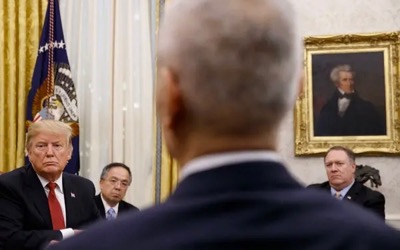
While the foreign ministers of NATO member countries were celebrating the 70th anniversary of the Atlantic Alliance in Washington, US President Donald Trump held talks with the Chinese Deputy Prime Minister Liu He.
During the conversation with journalists which took place before the official interview, President Trump surprised everyone by talking about the possibility of negotiating a reduction in spending on nuclear weapons with China and Russia [1].
For their part, the NATO foreign ministers mentioned the US withdrawal from the INF Treaty (Treaty on Intermediate Range Nuclear Forces) and once again raised the "Russian threat" as justification for the United States’ decision.
However, the NATO Secretary General, Jens Stoltenberg, assured the meeting that he does not see, at least for now, a return to the controversy that arose at the time of the so-called "euromissile" crisis, that is, a debate about a deployment in Europe of launching platforms for nuclear weapons which would transform the region into a potential nuclear battlefield.
At least 10 countries currently have atomic weapons: Saudi Arabia, the People’s Republic of China, North Korea, the United States, France, India, Israel, Pakistan, the United Kingdom and the Russian Federation.
But only the Big 3 (United States, Russia and China) possess the so-called nuclear triad, the combination of intercontinental ballistic missiles, nuclear submarines and strategic air bombers, supposed to make the actual deployment of atomic weapons both dissuasive and credible under any circumstances. Not only do these 3 countries possess all the categories of nuclear weapons in existence today but, most importantly, they are far ahead of the other States in terms of nuclear technology.
From a strictly economic point of view, there is a great difference between the cost of atomic weapons and conventional weapons, since the costs are never recovered given that nuclear weapons are not exported. In fact, the only nuclear disarmament negotiations which have ever had any success were those which evolved at the end of the cold war, when nuclear armament expenditure had become untenable, especially for the USSR, whose territory was much larger than the U.S.
In short, all attempts at nuclear disarmament based on moral considerations have ended in failure. The most recent example is when President Barack Obama, after receiving an “anticipatory” Nobel Peace prize thanks to his electoral promises in favor of nuclear disarmament, ended up abandoning his promises.
On the other hand, Donald Trump takes an economic view, contradicting the rhetoric of "the Russian threat" which was brought up again during the meeting of the NATO foreign ministers.
China and Russia see the issue of nuclear disarmament from the same perspective as the current president of the United States.
[1] “Remarks by Donald Trump and Liu He Before Bilateral Meeting”, by Donald Trump, Liu He, Voltaire Network, 4 April 2019.















Stay In Touch
Follow us on social networks
Subscribe to weekly newsletter